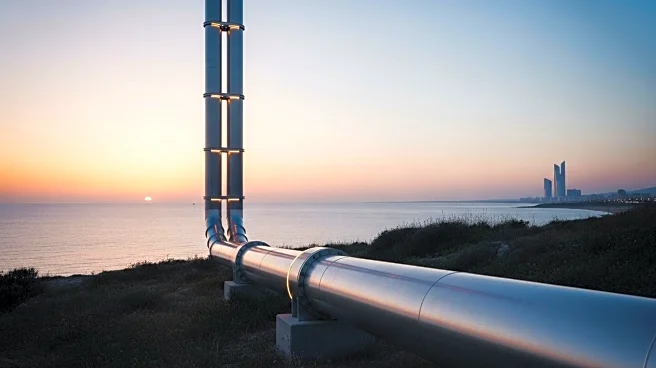What's Happening?
The Athens Riviera Summit 2025 has brought together key figures from the energy sector to discuss the extension of the Vertical Corridor's temporary monthly capacity product 'Route 1' for 2025/2026. The Vertical Corridor, involving Greece, Bulgaria, Romania, Moldova, and Ukraine, aims to enhance energy security by facilitating natural gas deliveries from Greece to Ukraine. The transmission system operators (TSOs) have submitted a joint letter requesting swift approval from national regulatory authorities to ensure necessary gas flows to Ukraine during the winter and injection season. This initiative is part of a broader effort to diversify gas sources and strengthen regional energy security.
Why It's Important?
The extension of the Vertical Corridor's capacity product is crucial for improving energy security in Central and Eastern Europe. By enabling the transportation of natural gas from Greece to Ukraine, the initiative provides alternative and competitive sources of energy, reducing reliance on Russian gas. This development is significant for Ukraine, which faces ongoing challenges in securing stable energy supplies amid geopolitical tensions. The collaboration among TSOs highlights the importance of regional cooperation in addressing energy security issues and fostering resilience against potential disruptions.
What's Next?
The approval of the capacity extension is expected to facilitate increased gas flows to Ukraine, enhancing its energy security during critical periods. The initiative may also lead to further investments in infrastructure upgrades and the development of new LNG terminals in the region. As the Vertical Corridor becomes fully operational, it could serve as a model for similar projects aimed at diversifying energy sources and strengthening regional cooperation. The success of this initiative may prompt other countries to explore similar strategies to enhance their energy security.
Beyond the Headlines
The Vertical Corridor's development has broader implications for the energy landscape in Europe. By reducing dependence on Russian gas, the initiative contributes to the geopolitical stability of the region. It also underscores the importance of diversifying energy sources and investing in infrastructure to support sustainable energy solutions. The collaboration among countries involved in the Vertical Corridor reflects a growing trend towards regional partnerships in addressing energy challenges, which could lead to long-term shifts in energy policy and market dynamics.










